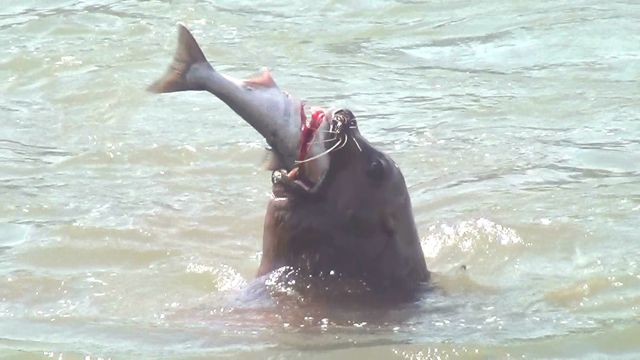forum
library
tutorial
contact

Sea Lions Step Up
Endangered Salmon Feast
by Steven Johnson
Electric Co-op Today, October 19, 2015
|
the film forum library tutorial contact |

|
Sea Lions Step Up
by Steven Johnson
|
Sea lions in the Pacific Northwest are extending their reach and their consumption of endangered
fish species that ratepayers in the region spend hundreds of millions of dollars to protect.
 A report released by the Oregon Department of Fish and Wildlifeshows that about 50 California sea lions tore into 5,775 spring chinook salmon and steelhead at Willamette Falls this year.
A report released by the Oregon Department of Fish and Wildlifeshows that about 50 California sea lions tore into 5,775 spring chinook salmon and steelhead at Willamette Falls this year.
That amounts to 10 percent of the Willamette River spring chinook salmon run and is a record for the falls, about 45 miles south of Bonneville Dam, where game officials have been killing sea lions for gorging themselves on fish.
"Estimated California sea lion predation on salmonids below Willamette Falls in 2015 was notably higher than in 2014 and presumably higher than any year prior to that," said the report, authored by the agency's Bryan Wright, Tom Murtagh and Robin Brown.
"It was also higher than that estimated in many previous years at Bonneville Dam, although 2015 also saw record high predation at that site," they added.
The issue of sea lion predation on fish, especially runs protected by the Endangered Species Act, has plagued Northwest utilities for years. About one-third of Bonneville Power Administration's wholesale power costs to electric cooperatives and other customers goes to fish and wildlife mitigation, a total that hit $782 million in 2014.
The report said the record predation at Willamette Falls most likely was a result of higher numbers of sea lions visiting from the Pacific and dwelling below the falls for longer than usual.
Flows at the Willamette River also were lower and clearer than normal, the report said, making it easier for sea lions to catch their prey. The mammals appear to move regularly between Willamette Falls and Bonneville Dam.
In the past, wildlife officials have tried to drive away sea lions at Willamette Falls using non-lethal hazing techniques, such as pyrotechnics.
Those appeared to have little effect; the report said sea lions simply moved downstream temporarily and then returned after hazing activities concluded for the day. The program was discontinued after 2013.
For now, the report said game managers should step up monitoring, trap and mark sea lions caught at Willamette Falls, and improve their estimates of sea lion population and residency rates at the falls.
learn more on topics covered in the film
see the video
read the script
learn the songs
discussion forum
